#Thesprotia
Explore tagged Tumblr posts
Photo
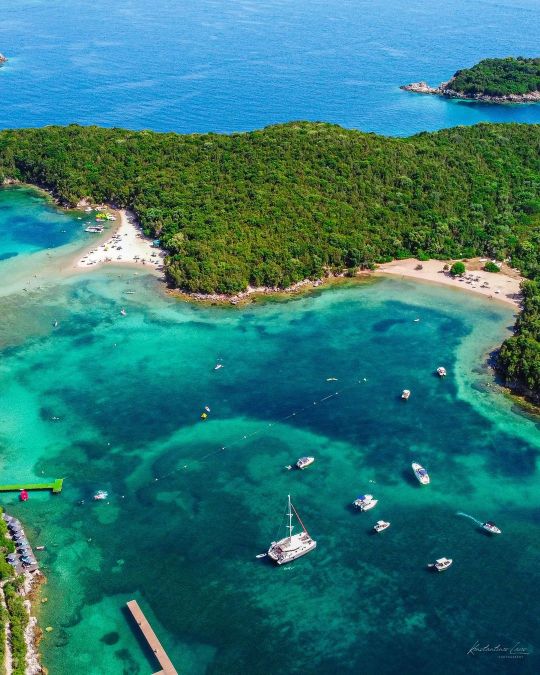
𝘉𝘦𝘭𝘭𝘢 𝘝𝘳𝘢𝘬𝘢, 𝘚𝘪𝘷𝘰𝘵𝘢 𝘛𝘩𝘦𝘴𝘱𝘳𝘰𝘵𝘪𝘢𝘴 || Kᴏɴsᴛᴀɴᴛɪɴᴏs Lᴀɪᴏs
#greece#europe#travel#drone photography#bird's eye view#beach#coast#landscape#shoreline#places#bella vraka#syvota#thesprotia#epirus#mainland
178 notes
·
View notes
Text

Mercedes Benz O322 της Βιαμάξ με αριθμό ανεμοθώρακα «20» στο ΚΤΕΛ Θεσπρωτίας, ιδιοκτήτης ο Κώστας Ντάνης.Στη φωτογραφία από τον Βασίλειο Παραμυθιώτη, επάνω, ο Ντάνης από την πρώτη ημέρα παραλαβής του λεωφορείου του από τη «Βιαμάξ», σε κυκλοφορία με δοκιμαστικό αριθμό τύπου «Μ».
Πηγή και περισσότερα στο:https://busoldtimers.blogspot.com/2014/10/blog-post_25.html
#λεωφορείο#ΚΤΕΛ Θεσπρωτίας#αριθμός 20#Mercedes Benz O322#Βιαμάξ#1950s#Κώστας Ντάνης#bus#old bus#Greece#Thesprotia#Epirus#50s#old photo
7 notes
·
View notes
Text
Grekët në kufi me Shqipërinë protestojnë kundër reduktimit të ushtrisë
Banorët e rajonit kufitar të Thesprotisë kanë dalë në protesta në Athinë, duke kundërshtuar mbylljen e Batalionit 628 të Këmbësorisë në Filat, si pjesë e reformës në forcat e armatosura greke. Protesta dhe shqetësimet e banorëve Banorët dhe kryetarët e bashkive të Filatit, Gumenicës dhe Sulit argumentojnë se reduktimi i pranisë ushtarake: Cenon sigurinë e kufirit, veçanërisht për shkak të…
#banorët#Batalioni 628#ekonomia lokale#emigracion i paligjshëm#Filat#Greqia#Ministria e Mbrojtjes#protesta#rajonet kufitare#reduktim#reforma ushtarake#rezolutë#siguria kufitare#Thesprotia#trafiku i drogës#ushtria greke
0 notes
Text
Michael Pasiakos (1959-2023): an Obituary
Ο Καλός μου Φίλος Μιχάλης Πασιάκος (1959-2023), οι Αχανείς Αναζητήσεις του, και η πάντοτε Άφθαστη για μένα Σαγιάδα
Краткое содержание на русском языке в конце / Deutsche Zusammenfassung am Ende / Résumé en français à la fin / English Summary at the end
Η γνωριμία μου με τον Μιχάλη άρχισε με μία ολότελα απρόσμενη πρόσκληση! Αυτή προερχόταν από μία χώρα από την οποία δεν είχα περάσει ούτε καν για μία φορά τα προηγούμενα δεκα οκτώ (18) χρόνια: την Ελλάδα. Από τον Ιούλιο του 2001, οπότε είχα φύγει, ούτε είχα σκεφθεί να επισκεφθώ κάποια περιοχή της χώρας, ούτε είχα επικοινωνήσει με κανένα, ούτε και μου είχε κάποιος γράψει.
Περιεχόμενα
Ι. Ο Πεπερασμένος Κόσμος μου από το Μαρόκο μέχρι την Κίνα και ο Απέραντος Κόσμος του Μιχάλη στην Σαγιάδα
ΙΙ. Περιστατικά της εξ αποστάσεως γνωριμίας μας
ΙΙΙ. Όταν η ανταλλαγή μηνυμάτων μετατράπηκε σε επικοινωνία με emails
ΙV. Όταν ο Μιχάλης αυτο-προσδιορίστηκε: Άθεος, Αναρχικός κι Αγρότης!
V. Οι τελευταίες επικοινωνίες μας
VΙ. Una furtiva lagrima ή ξηροῖς ἀκλαύτοις ὄμμασιν;
Επίμετρο
Краткое содержание / Zusammenfassung / Résumé / Summary

Ήταν Νοέμβριος του 2019 και, ως συνήθως, βρισκόμουν σε πολλά ταξείδια. Όλα άρχισαν με ένα μήνυμα που δέχθηκα στον λογαριασμό μου στο μεγάλο πόρταλ academia dot edu. Είχε αποσταλεί από τον Μιχάλη και ήδη με την πρώτη ανταλλαγή μηνυμάτων με προσκαλούσε να δώσω μία διάλεξη στους Φιλιάτες, μία μικρή πόλη της ΒΔ Θεσπρωτίας την οποία είχα πολύ παλιά επισκεφθεί για μόνον μισή ώρα, ένα απόγευμα του 1964, όταν πήγαινα ταξείδι με τους γονείς μου και ένα ζευγάρι θείων μου στην Κέρκυρα.
Ποτέ δεν ξέχασα εκείνη την βανίλια-υποβρύχιο που είχα απολαύσει σε ένα καφενείο της πλατείας απέναντι στην εκκλησία της κωμόπολης. Όπως και ποτέ δεν ξέχασα την αποτυχία μου να πείσω τον θείο μου να μας οδηγήσει από την Ηγουμενίτσα, όπου εφθάσαμε αργότερα και εβγάλαμε αρκετά νωρίς τα εισιτήρια για το φέρρυ μπωτ, στην κοντινή Σαγιάδα, εφόσον η απόσταση ήταν κοντινή και ούτως ή άλλως, θα περιμέναμε ακόμη για 45 λεπτά μέχρι τον απόπλου για την Κέρκυρα.
Όλα αυτά είχαν για πολλές δεκαετίες παραμείνει βαθειά στις χαράδρες της μνήμης μου αλλά αυτόματα ανασύρθηκαν στην επιφάνεια χάρη στο μήνυμα-πρόσκληση του μακαρίτη πλέον σήμερα Μιχάλη. Ωστόσο, μου είχε φανεί παράξενο να προσκληθώ να μιλήσω σε μία πόλη, την οποία εγνώριζα τόσο λίγο, για θέματα της ειδίκευσής μου, τα οποία τόσο ελάχιστα θα ενδιέφεραν το εν Φιλιάταις φιλομαθές κοινό. Με άλλ�� λόγια, τα τόσο αντιφατικά στοιχεία μιας τέτοιας πρόσκλησης ντε φάκτο με έκαναν να ενδιαφερθώ για τον μυστηριώδη αποστολέα.
Ι. Ο Πεπερασμένος Κόσμος μου από το Μαρόκο μέχρι την Κίνα και ο Απέραντος Κόσμος του Μιχάλη στην Σαγιάδα
Έτσι και εγώ, πριν απαντήσω, ανακάλυψα .... the United States of Σαγιάδα, ή για να είμαι πιο ακριβής, τον Μιχάλη ... dans tous ses états! Δηλαδή μυήθηκα στα ατελείωτα μυστικά και στα άγνωστα σε μένα πιο πριν αλλά ιδιαίτερα σημαντικά τοπία και μνημεία, περιστατικά και γεγονότα της περί την Σαγιάδα Θεσπρωτίας που τόσο θαυμάσια και τόσο πλουσιοπάροχα εκείνος αναπαριστούσε στο μπλογκ του.
Και σ' αυτή την τόσο απίθανη και τόσο ξεχωριστή ικανότητα του Μιχάλη οφείλονται οι παραπάνω όροι τους οποίους εδημιούργησα κάθε τόσο επισκεπτόμενος το -εξαιρετικό και βαθύπλουτο σε γνώσεις, στοιχεία, αναλύσεις, περιγραφές, τεκμήρια και ιστορικές φωτογραφίες- μπλογκ του, La Bastia (https://labastia.blogspot.com/), όπου εκείνος, με αναφορά στην παλαιότερη, ιταλική ονομάσία της Σαγιάδας, με πρωτοφανή συνέπεια, με ανεξάντλητη επινοητικότητα, και με υπερβατική αγάπη επέμενε να παρουσιάζει ακόμη και την τελευταία πέτρα της Θεσπρωτίας σε όλες της τις διαστάσεις.
Συνεχίστε στο PDF
---------------------------
Download the obituary in PDF:
#Michael Pasiakos#Pasiakos#Thesprotia#Filiates#Sagiada#Slavs in Greece#Macedonian minority in Greece#Μιχάλης Πασιάκος#Πασιάκος#Θεσπρωτία#Σαγιάδα#Φιλιάτες#Σλάβοι στην Ελλάδα#μακεδονική μειονότητα
0 notes
Text
After years of working and living in Greece, I wanted to share another one of the wonderful villages I got the privilege of working in. It is stunning and away from the mass crowds on the islands and around the tourist traps.
0 notes
Text
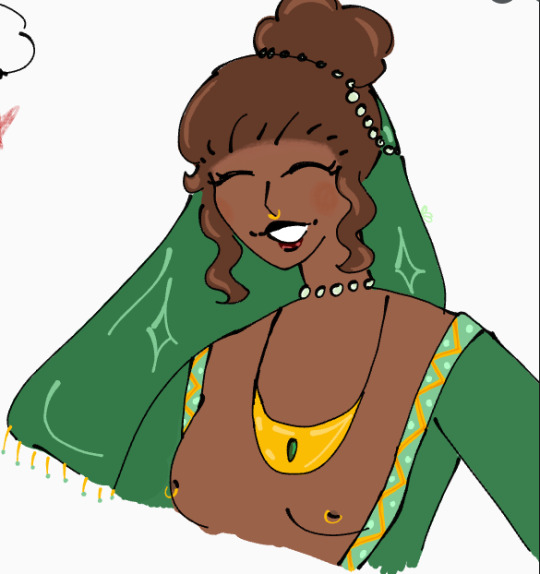
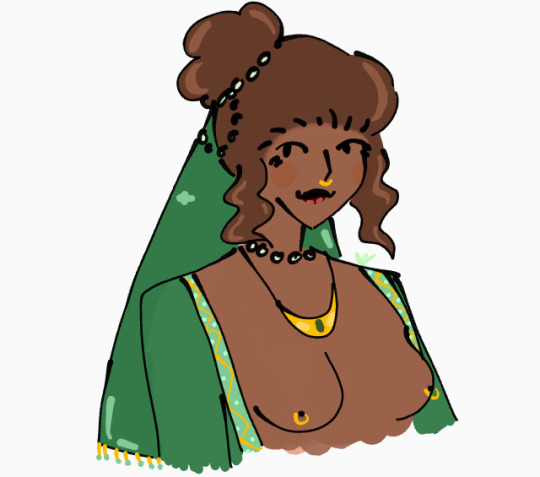
I'm the number 1 Callidice fan. GIVE HER MORE ATTENTION!!
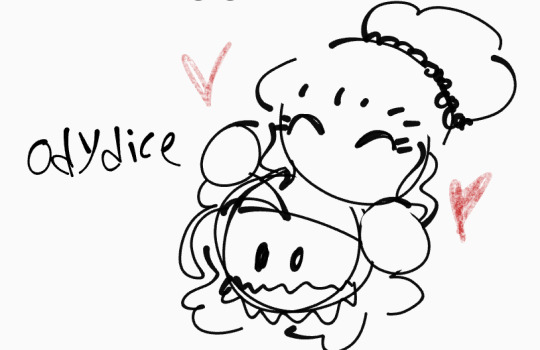

extra stuff
#tagamemnon#greek mythology#odysseus#the telegony#telegony#Callidice#Kallidice#Kallidike#odysseus x Callidice#Odydice#Blue-lotus arts#epic cycle#odysseus of ithaca#Callidice of Thesprotia#Kallidike of Thesprotia#greek myths#Callidice x Odysseus
24 notes
·
View notes
Text
Odydice edit :D
Callidice's drawings belong to @blue-lotus333
4 notes
·
View notes
Text

I've mentioned Phobos' twin sister Persephone before, but little about their mother Demeter.

The Lethe family has a long and complicated history with Amaurot; from the day the treaties were signed, Thesprotia has been a part of but separate from Amaurot proper. Those residing in Thesprotia are subject to Thesprotian Justice. The people there, while oft confused for proper ancients, are truthfully dryads descended from a world tree they refer to as Grandmother.
Like many of her ancestors, Demeter claimed the seat of Halmarut when the need arose in ancient Amaurot and held it in good standing. She chose a mate from among the ancients and bore a pair of identical twins before returning her focus to her duties. She taught them little more than that children were for display and then to be put away and be silent until their formal education began; even then silence and compliance were expected.
Phobos and Persephone rebelled in their own ways; Phobos honing his silence and genially cool demeanor into potent weapons and simply going around the rules and obstacles Demeter laid down. Persephone challenged the woman with the appearance of recklessness, deliberately and pointedly cracking her mother's pristine reputation at every turn.

Determined that her eldest would be the perfect daughter and follow in her footsteps, to say she was enraged that Phobos chose gender affirming care and reforging his identity with the support of his twin and dearest friends would gravely understate the situation. When Demeter attempted to bar him from Thesprotia until he 'came to his senses', Grandmother intervened - such a rarity that even those outside the body garden took note of it.
Shortly after Phobos' marriage to the then-current Emet-Selch - properly done in Thesprotian ritual - Phobos, Persephone, and Emet-Selch hatched a plan to rid themselves - and Thesprotia - of the bitter woman. Phobos approached his mother with a seeming compromise, that he would take the seat of Halmarut as she wished, if she would just step down.
Demeter took the bait, naming him her preferred successor - only for Persephone to take the seat instead, while Phobos snatched the headship of the family from under Demeter. The woman banned from Thesprotia and judged wanting by Amaurot, she left to visit the groves of her sisters and aunts, searching for a method of revenge.
It emerged in the form of a newly-appointed Azem summoning Emet-Selch to her aid in a truly rotten and decaying grove. Before either Convocation member could call in backup from the twins, Demeter triggered a deadfall that dropped Emet-Selch into the roots of the grove's mother tree, leaving them to die to Thesprotian Justice. Azem, unaware the trap had been deliberately sprung rather than being as ancient as the grove, returned to Amaurot with the horrifying news.
Phobos retreated to Thesprotia, refusing to take on his spouse's former seat and nigh paralyzed with the grief - unaware of the true fate of spouse and mother both.


#cryptidscreens#about phobos#guest muse; sephie#guest muse; demeter#abuse mention#locations; thesprotia#out of commands;
2 notes
·
View notes
Text
“πολλῶν δ᾽ ἀνθρώπων ἴδεν ἄστεα καὶ νόον ἔγνω…” (of many men he saw their cities and learned their mind…)
Ok you stop right there Homer. Tell me the cities you speak of.
Are they…
Ismarus: bro you just destroyed their city…and “learned their mind” on revenge. That surely counts doesn’t it
The land of the Lotus-eaters: bro you just sent three men to eat lotus, and you weren’t sightseeing at all cuz you didn’t even mention any city
The land of the Cyclopes: bro you went to a cave, not the city—if there was one, that is
Aeolia: bro that’s a god, and his children too
Telepylus: bro they’re giants
Aeaea: bro that’s a goddess, and no city
Hades: …
Thrinacia: bro they’re cattle and sheep, and still no city
Ogygia: bro that’s a goddess, and still no city
Scheria: yes definitely, the Phaeacians, and their Xenia
Home sweet home
Final count: 1, honestly
Ok so that’s a “lot” of cities to see…right? Enough for you to use the plural ἄστεα, right Homer?
That doesn’t compute.
Now seriously, what are the cities Homer was talking about? It can’t be the ones Odysseus had visited before the war (cuz “ἐπεὶ Τροίης ἱερὸν πτολίεθρον ἔπερσεν:”—“after he sacked the sacred citadel of Troy”), and now that we’ve seen, they’re not really included in Odysseus’s return. So is it actually from other versions of Odysseus’s story, or are they nowhere to be found?
Unless…if you’re including his oar quest after his return:
“ἐπεὶ μάλα πολλὰ βροτῶν ἐπὶ ἄστε᾽ ἄνωγεν ἐλθεῖν…” (since he (Teiresias) has ordered me to go to quite a lot of cities of mortals…)
Problem solved. Homer was talking about something that’s not even in his epic at the very beginning of his epic. what a clickbait smh /lhj
Again, seriously, the part of Odysseus’s return is actually included in the next two lines: “πολλὰ δ᾽ ὅ γ᾽ ἐν πόντῳ πάθεν ἄλγεα ὃν κατὰ θυμόν, ἀρνύμενος ἥν τε ψυχὴν καὶ νόστον ἑταίρων.” (at sea he endured many pains in his soul, striving to secure his life and the companions’ return.) (and of course he didn’t get the latter) and judging by the forms of the verbs (ἴδεν, ἔγνω, πάθεν are normal aorist verbs, while ἀρνύμενος is a participle), line 5 is the continuation of line 4 while line 3 and 4 are parallel to each other, each summarizing a journey that Odysseus undertook (line 3 is about Ody’s oar quest while line 4 and 5 about the Odyssey). This is a brilliant design.
And it might indicate that Odysseus’s second journey is of some importance too.
So, Homer, tell us the cities you speak of. We would like to know.
#just ignore these Greek words if you can’t read them#I’m analyzing based on the original text so that I can be translation-free#epic the musical#tagamemnon#odysseus#the odyssey#greek mythology#homer’s odyssey#homer#ancient greek#classics#possessed by Nestor#So Homer give us your full version of Ody’s oar quest please#We need it so bad#Not the one some random guy named Eugammon of Cyrene had written—#I know you hate Thesprotia too don’t you Homer#So please I’m begging you /j#i’m begging please#Lyculī sermōnēs#the sailor and the oar
34 notes
·
View notes
Text

OHHHHHH i have been trying to figure out how alexander is related to cassandra for five thousand years but if he is the lion & the argives are the persians that makes perfect sense. okay sorry everyone who i have accused of lying on this matter very loudly in front of vast audiences
#aeacus and dardanus is sort of like saying achilles & zeus with extra steps i suppose. thesprotia is in epirus so olympias#& the other one erm well. need all mysteries be explained?
1 note
·
View note
Photo

Wetlands of Drépano, Thesprotia, Greece by Kafetsis A. Fotis.
#greece#photography#landscape#travel#earth#wetlands#waterscape#drone photography#hersonisos of drepano#drepano#thesprotia#epirus#mainland#large
48 notes
·
View notes
Text









greek mythology: dione
dione was the titan goddess of the oracle of dodona in thesprotia, and the mother of aphrodite by zeus. her name is simply the feminine form of zeus. dione was described as "the temple associate" of zeus at dodona. the three elderly prophetesses of the shrine, known collectively as the peleiades, were probably her priestesses. these women were named "the doves" after the sacred bird of dione's daughter aphrodite who also posssessed a temple at the shrine.
279 notes
·
View notes
Text
PERSEPHONE; A GUIDE TO WORSHIP.
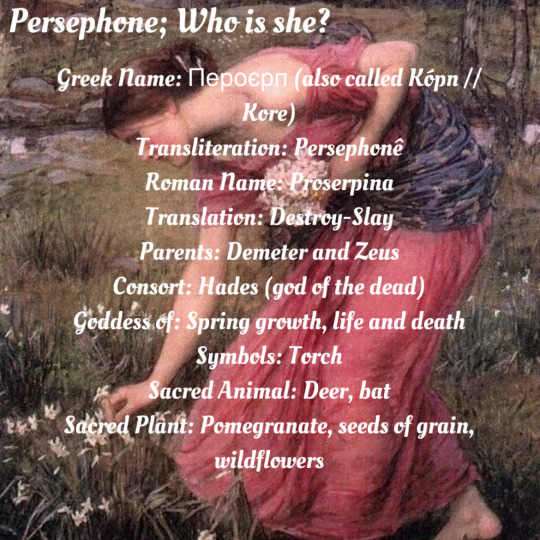
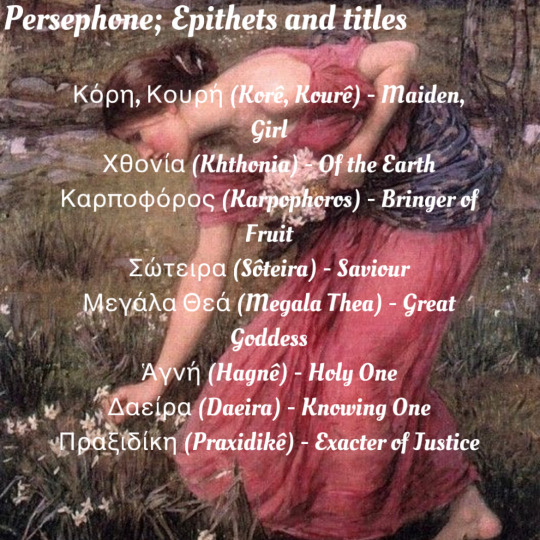
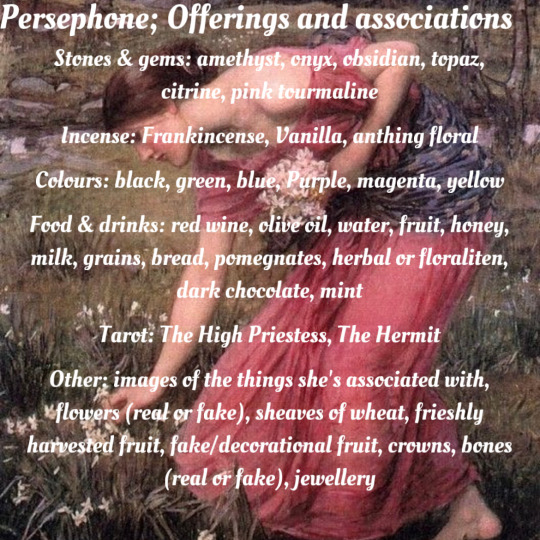
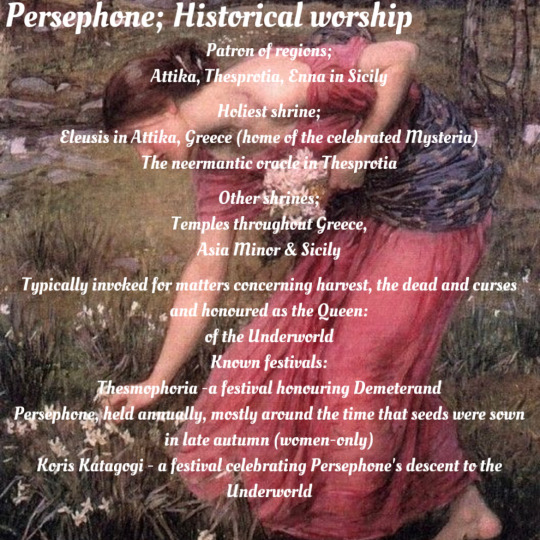
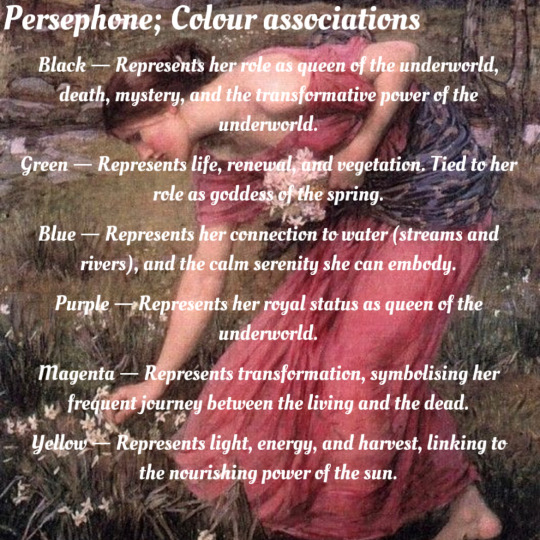
TEXT BELOW;
Persephone;
Greek Name: Пероєрп (also called Kópn // Kore)
Transliteration: Persephonê
Roman Name: Proserpina
Translation: Destroy-Slay
Parents: Demeter and Zeus
Consort: Hades (god of the dead)
Goddess of: Spring growth, life and death
Symbols: Torch
Sacred Animal: Deer, bat
Sacred Plant: Pomegranate, seeds of grain, wildflowers
Epithets and titles;
Κόρη, Κουρή (Korê, Kourê) - Maiden, Girl
Χθονία (Khthonia) - Of the Earth
Καρποφόρος (Karpophoros) - Bringer of Fruit
Σώτειρα (Sôteira) - Saviour
Μεγάλα Θεά (Megala Thea) - Great Goddess
Ἁγνή (Hagnê) - Holy One
Δαείρα (Daeira) - Knowing One
Πραξιδίκη (Praxidikê) - Exacter of Justice
Offerings and associations;
Stones & gems: amethyst, onyx, obsidian, topaz, citrine, pink tourmaline
Incense: Frankincense, Vanilla, anthing floral
Colours: black, green, blue, Purple, magenta, yellow
Food & drinks: red wine, olive oil, water, fruit, honey, milk, grains, bread, pomegnates, herbal or floraliten, dark chocolate, mint
Tarot: The High Priestess, The Hermit
Other: images of the things she's associated with, flowers (real or fake), sheaves of wheat, frieshly harvested fruit, fake/decorational fruit, crowns, bones (real or fake), jewellery
Historical worship;
Patron of regions;
Attika, Thesprotia, Enna in Sicily
Holiest shrine;
Eleusis in Attika, Greece (home of the celebrated Mysteria)
The neermantic oracle in Thesprotia
Other shrines;
Temples throughout Greece,
Asia Minor & Sicily
Typically invoked for matters concerning harvest, the dead and curses and honoured as the Queen:
of the Underworld
Known festivals:
Thesmophoria -a festival honouring Demeterand
Persephone, held annually, mostly around the time that seeds were sown in late autumn (women-only)
Koris Katagogi - a festival celebrating Persephone's descent to the Underworld
Colour associations;
Black — Represents her role as queen of the underworld, death, mystery, and the transformative power of the underworld.
Green — Represents life, renewal, and vegetation. Tied to her role as goddess of the spring.
Blue — Represents her connection to water (streams and rivers), and the calm serenity she can embody.
Purple — Represents her royal status as queen of the underworld.
Magenta — Represents transformation, symbolising her frequent journey between the living and the dead.
Yellow — Represents light, energy, and harvest, linking to the nourishing power of the sun.
28 notes
·
View notes
Text
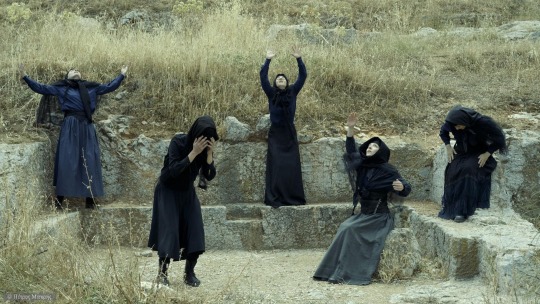
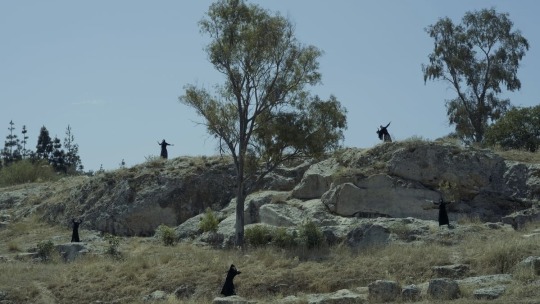
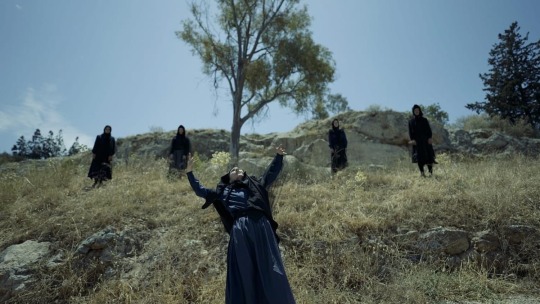
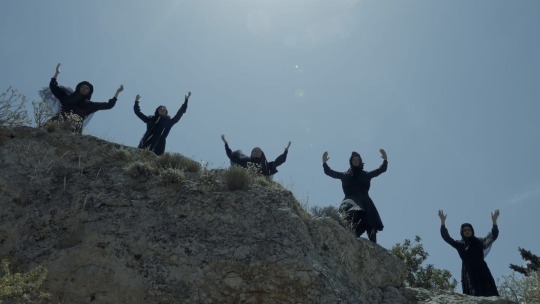
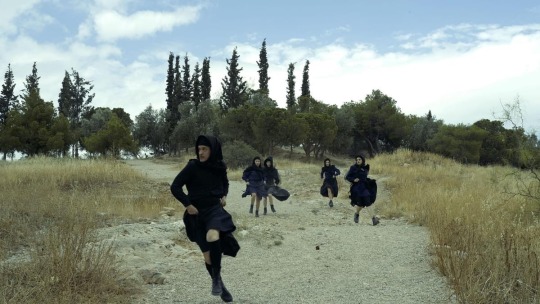
Itsa of Sasma or, The Backwards Dance (Η Ίτσα του Σάσμα ή, Ο Ανάποδος Χορός) by Vassilis Nitsiakos, dir. Konstantinos Markellos. Ancient Theatre of Gitana, Thesprotia, 2024.
26 notes
·
View notes
Text
Collection of Stesichorus of Himera's Mythical Fragments
Stesichorus was one of the lyric poets the writers of Alaxandria praised. Unknown when he lived, but guesses are somewhere in the 7th-6th century BC, between the dating of the Homeric epic and Attic tragedy. Known for composing poems for wider Greek audience, creating narratives of the myths, with his influences been seen in the following literatures notably in Aeschylus' and Euripides', making some of their plays a semi-adaptation of his works. Reportedly he wrote roughly 26 works attributed to him namely Helen, two Palinodes, Sack of Troy, Wooden Horse, Cerberus, Nostoi, Geryoneis, Cycnus, Skylla, Eriphyle, Oresteia, Thebaid, Europa, and Boar-hunters.
I made a separate post about Stesichorus being the surviving source on the Helen in Egypt story.
Once again, mythology only. Full collection of his fragments can be found in Loeb.
190 Scholiast on Iliad (‘our covenants and oaths’, Nestor) When the best men of Greece had come to woo Helen because of her lineage and beauty, her father Tyndareus, according to some authorities, was eager to avoid making enemies of the others by choosing one of them; so he made them all alike swear that if the successful suitor were ever wronged on her account they would all come energetically to his help. That is why he gave her to Menelaus. Not long afterwards, when she was carried off by Alexander, they took part in the expedition because of the oaths they had sworn. The story is in Stesichorus.
191 Pausanias, Description of Greece (on Argos) Near the Lords is a sanctuary of Eileithyia, dedicated by Helen at the time when Theseus had gone with Pirithous to Thesprotia and Aphidna was captured by the Dioscuri and Helen was being taken to Sparta. They say that she was pregnant and that after giving birth in Argos and founding the sanctuary of Eileithyia she gave her baby daughter to Clytemnestra, who was already the wife of Agamemnon, and later on married Menelaus. Euphorion of Chalcis and Alexander of Pleuron, who wrote poetry on this subject, and even earlier Stesichorus of Himera all agree with the Argives that Iphigenia was Theseus’ daughter.
192 Plato, Phaedrus For those who have sinned in their telling of myths there is an ancient purification, known not to Homer but to Stesichorus: when he was blinded because of his slander of Helen he was not unaware of the reason like Homer, but being devoted to the Muses recognized the cause and immediately wrote That story is not true, and you did not go on the well-benched ships and you did not reach the citadel of Troy; and having composed all the Palinode, as it is called, he at once regained his sight. Isocrates, Helen She (Helen) displayed her power to the poet Stesichorus also: for when at the beginning of his song he uttered a blasphemy against her, he stood up deprived of his sight; but when he had realised the cause of his plight and had composed the Palinode, as it is called, she restored him to his original condition. Plato, Republic . . . just as Helen’s phantom, according to Stesichorus, was fought over by the warriors at Troy in ignorance of the truth. Aelius Aristides, Orations . . . just as some of the poets say Alexander took Helen’s phantom but was unable to take her. Scholiast: Stesichorus in his poetry tells that when Alexander had seized Helen and was making his way through Pharos he was robbed of her by Proteus and received from him her portrait painted on a panel, so that he could assuage his passion by looking at it. Aelius Aristides, Orations . . . just like the Trojans of Stesichorus, who have Helen’s phantom, believing it to be Helen herself. Dio Chrysostom, Discourses These men, he said have had such a ridiculous effect on you Greeks that you say that another poet who was persuaded by Homer and gave in full the same account of Helen—Stesichorus, I believe—was blinded by Helen for telling lies and got his sight back when he told the opposite story . . . Stesichorus, you allege, said in his later song that Helen never sailed anywhere, whereas others say that Helen was carried off by Alexander but came here to us in Egypt.
193 Papyrus commentary on lyric poets (2nd c. a.d.) . . . (in one Palinode) he blames Homer because he put Helen in Troy, not her phantom; and in the other he blames Hesiod: for there are two different Palinodes, and the beginning of one is Hither again, goddess, lover of song and dance, and of the other Golden-winged maiden, as Chamaeleon wrote. Stesichorus himself says that the phantom went to Troy while Helen remained with Proteus. He made such innovations in his stories that he says that Demophon, son of Theseus, was brought to Egypt with the Thestiadae in the homecoming from Troy, and that Demophon was Theseus’ son by lope, daughter of Iphicles, Acamas his son by Phaedra, Hippolytus by the Amazon . . . Helen . . . Agamemnon . . . Amphilochus. . .
194 Sextus Empiricus, Against the Professors For the historians, working on a false assumption, say that Asclepius, the founder of our science,1 was killed by a thunderbolt; and not satisfied with this lie they make various changes to its content: Stesichorus in his Eriphyle says that he raised from the dead some of those who fell at Thebes, whereas Polyanthus . . . Scholiast on Pindar It is said that Asclepius was enticed by gold to raise up the dead Hippolytus; others say he raised Tyndareus, others Capaneus, others Glaucus, the Orphics Hymenaeus, while Stesichorus speaks of Capaneus and Lycurgus
195 Scholiast on Euripides, Phoenissae (‘from the teeth the earth sent up’ armed men) Stesichorus in his Europia says that it was Athena who sowed the teeth.
197 Pausanias, Description of Greece (on Polygnotus’ painting of the fall of Troy in the Cnidian Lesche at Delphi) Now Stesichorus in his Sack of Troy lists Clymene among the captive women.
198 Pausanias, Description of Greece (on the same painting) With regard to Hecuba Stesichorus said in his Sack of Troy that she was taken to Lycia by Apollo.
201 Scholiast on Euripides, Orestes (‘Before her beauty have their swords been blunted?’) I.e., after looking on Helen’s beauty did they fail to use their swords? Stesichorus indicates something similar in connection with the men who are on the point of stoning her: he says that the moment they saw her face, they dropped their stones on the ground.
202 Scholiast on Euripides, Andromache (‘Astyanax thrown from the walls’) They say that in the matter of the Trojan stories Euripides (did not wish) to heed Xanthus2 but rather the more useful and trustworthy authorities: for Stesichorus said that Astyanax died, and the cyclic poet who put together the Sack of Troy made the additional point that he was thrown from the wall; and Euripides followed him.
S 107 . . . desirable . . .; and thus (she)[Helen] addressed him[Menelaus] . . .: ‘How (can you) love (me who) bearing an evil name. . .? So (she spoke), and (he answered) her . . .
207 Scholiast on Pindar (‘Even the mighty Heracles was routed by the fight against Cycnus’) The story that Cycnus, son of Ares, was killed by Heracles after the latter had fled from him is told by Stesichorus in the poem entitled Cycnus. Cycnus, son of Ares, lived in the pass of Thessaly and beheaded strangers who came along in order to build a temple to Panic from the skulls. He plotted against Heracles when he came along, and after a fight Heracles turned in flight, since Ares had helped Cycnus, his son; but later when he was alone Heracles defeated him.
215 Philodemus, Piety Stesichorus in his Oresteia follows Hesiod and identifies Agamemnon’s daughter Iphigenia with the goddess called Hecate.
216 Scholiast on Euripides, Orestes It is clear that the play is set in Argos. But Homer puts Agamemnon’s palace in Mycenae, Stesichorus and Simonides in Sparta.
217 Papyrus commentary (2nd c. a.d.) . . . Stesichorus used narratives (of Homer? and Hesiod?), and most of the other poets used his material; for after Homer and Hesiod they agree above all with Stesichorus. Aeschylus, for example, in composing his trilogy the Oresteia—Agamemnon, Choephori, Eumenides—managed the recognition1 by means of the lock of hair: this is in Stesichorus. Euripides says of Orestes’ bow that it had been given to him as a gift by Apollo: his lines are, ’Give me the horn-tipped bow, the gift of Loxias, with which Apollo told me to ward off the goddesses’ (Orestes 268 f.)2; and in Stesichorus we find and I shall give you this bow fitted (?) to my hands. . . for shooting mightily. And Euripides made Iphigenia (come to Aulis) to marry Achilles.
218 Scholiast on Aeschylus, Choephori Aeschylus calls Orestes’ nurse Cilissa, Pindar Arsinoe, Stesichorus Laodamia.
219 Plutarch, On the slow revenge of the deity So Stesichorus makes Clytemnestra’s dream accord with reality and truth when he says something like the following: And it seemed to her that a snake came, the top of its head bloodstained, and out of it appeared a Pleisthenid king.
220 Scholiast on Apollonius of Rhodes (‘the malignant Ausonian Scylla, child of Phorcys’) Stesichorus in his Scylla says that Scylla is the daughter of Lamia.
223 Scholiast on Euripides, Orestes (‘Tyndareus fathered a family of daughters conspicuous for blame and of bad repute throughout Greece’) Stesichorus says that when Tyndareus was sacrificing to the gods he forgot Aphrodite: the goddess was angered and made his daughters twice-wed and thrice-wed and husband-deserters. The passage runs as follows: because Tyndareus when sacrificing one day to all the gods forgot the Cyprian only, kindly in her giving; and she in anger made the daughters of Tyndareus twice-wed and thrice-wed and husband-deserters.
224 Scholiast on Lycophron, Alexandra (Hector, ‘son of Ptoan Apollo’) Stesichorus and Euphorion say that Hector is Apollo’s son, as does the poet Alexander the Aetolian.
225 Plutarch, Whether sea or land animals are cleverer We are told by Stesichorus that the shield of Odysseus had a dolphin emblazoned on it
227 ��Apollodorus’, Library Cynortes’ son was Perieres, who married Perseus’ daughter Gorgophone, according to Stesichorus, and was father of Tyndareus, Icarius, Aphareus and Leucippus.
229 Athenaeus, Scholars at Dinner This too is why Megaclides finds fault with those successors of Homer and Hesiod who have said of Heracles that he led expeditions and captured cities . . . So, says Megaclides, Heracles is represented by the modern poets as travelling about alone in the guise of a bandit with club and lionskin and bow; and, he adds, it was Stesichorus of Himera who first thought this up. Xanthus, the lyric poet, who was earlier than Stesichorus, as Stesichorus himself testifies according to Megaclides, does not give him this equipment but represents him as Homer did. Many of Xanthus’ poems have been adapted by Stesichorus, for example the one called The Oresteia.
230 Pausanias, Description of Greece The Thebans point out a memorial to the children Heracles had by Megara, and their account of the death1 is exactly that given by Stesichorus of Himera and Panyassis in their verses. The Thebans add that Heracles in his madness intended to kill Amphitryon2 too, but fell asleep first on being struck by the stone; it was Athena, they say, who aimed this stone, which they call ‘the chastiser’.
232 Plutarch, On the E at Delphi So it was appropriate for Euripides to say (Suppliants 974b ff.); and still earlier Stesichorus said, Apollo loves dancing most of all and merriment and songs, but mourning and wailing are the portion of Hades.
233 Papyrus commentary on a poetic text (2nd c. a.d.) And in Stesichorus (Athena is described) at her birth: . . . shining in armour Pallas leaped to the broad earth. Scholiast on Apollonius of Rhodes (‘Athena, when she leaped all shining from her father’s head’) Stesichorus was the first to say that Athena sprang armed from the head of Zeus.
234 Scholiast on Iliad 23. 92 (‘the golden urn which your lady mother gave you’) When Dionysus had entertained Hephaestus on his arrival in Naxos, one of the Cyclades, he received from him the gift of a golden urn. Later, when he was pursued by Lycurgus and took refuge in the sea, Thetis gave him a kindly welcome, and he gave her the amphora, Hephaestus’ handiwork. She gave it to her son, so that when he died his bones might be put in it. The story is told by Stesichorus.
235 Scholiast on Iliad 6. 507 (‘as a horse runs clattering over the plain’) Stesichorus calls Poseidon lord of hollow-hoofed horses.
236 Pausanias, Description of Greece Travellers from Megara (to Plataea) have a spring on their right and, a little further on, a rock. They call the rock the bed of Actaeon, explaining that Actaeon used to sleep on it when exhausted from hunting; and they say that he looked into this spring when Artemis was bathing in it. Stesichorus of Himera wrote1 that the goddess wrapped a deerskin round Actaeon, ensuring that his hounds would kill him to prevent his marriage with Semele.
238 Scholiast on Apollonius of Rhodes (most of the Argonauts ‘claimed to be of the blood of the daughters of Minyas’) Minyas had many daughters: Jason himself is son of Alcimede, daughter of Minyas’ daughter Clymene. Stesichorus1 calls the latter Eteoclymene; Pherecydes makes him son of Alcimede, Phylacus’ daughter.
239 Etymologicum Genuinum Typhoeus: Hesiod makes him son of Gaia (Earth), Stesichorus son of Hera, who bore him without a father in order to spite Zeus.
274A Philodemus, Piety . . . according to Apollonides1 and Hesiod and Stesichorus in his (Oresteia?) and contrary to what I said before, that Cronus was thrown into Tartarus by him
279 | DAPHNIS Aelian, Historical Miscellanies While Daphnis was tending his cattle in Sicily, a nymph fell in love with him and had intercourse with him since he was handsome … She made an agreement with him that he must not make love to any other girl, and threatened that his fate was to be blinded if he broke it; and they kept this bargain. But later on a king’s daughter fell in love with him, and in a drunken state he broke the agreement and had intercourse with the girl. From that time onwards herdsmen’s songs1 were sung, having as their theme the story of his blinding. Stesichorus of Himera, they say, first composed this kind of song.
#tagamemnon#Stesichorus#heracles#zeus#poets#collection#fragments#greek myth#greek mythology#helen of troy#athena#Iphigenia
4 notes
·
View notes
Text
‘Me and my husband’ by Mitski is soo Callidice & Odysseus coded
#greek mythology#tagamemnon#odysseus#Callidice#kallidice#kallidike#Callidice of Thesprotia#Odydice#Odysseus x Callidice#Callidice x Odysseus#telegony#the telegony
10 notes
·
View notes